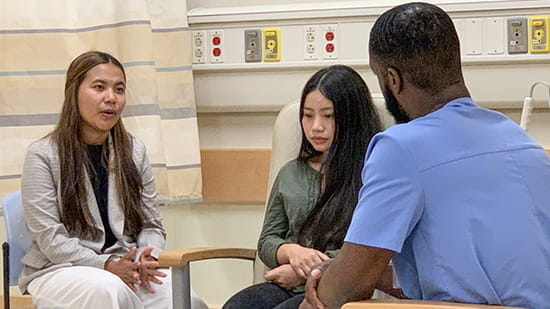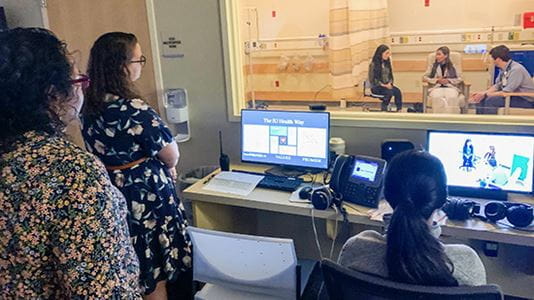Your patient is a 15-year-old Burmese female adolescent who came in alone for her well-child check. She speaks Hakha Chin and an interpreter is needed. During the conversation, she mentions having a boyfriend, but doesn’t want to answer any questions about her relationship because she knows the interpreter from her community. How do you proceed to provide optimal care?
This is the scenario that second-year residents faced during the annual IU School of Medicine Department of Pediatrics Simulation Olympics Day earlier this month. Each year, each class of pediatric residents completes eight simulations including many high stress situations such as a seizure or asthma attack. Global health scenarios have been included in the training event for the last three years to give residents experience in providing culturally humble care.
The simulations involve a team of three residents with one resident speaking with the patient while the other team members and faculty members observe from behind a mirror. The global health simulations are facilitated by Megan McHenry, MD, MS, director of pediatric global health education, and Shaina Hecht, MD, FAAP, and Palka Patel, MD associate directors of pediatric global health education. The simulations for residents in other years are related to reacting to cultural preferences for co-sleeping with an infant and a traveler who has returned from abroad with a fever. The scenarios were created by the Department of Pediatrics global health educators working with specialists in newborn, adolescent, and infectious diseases.
“This is an opportunity for residents to learn and practice these important skills in a non-stressful environment,” said Dr. Patel. Following the 10-minute scenario, the residents debrief with Drs. Patel and Hecht, as well as members of the Burmese community who participate in the simulation.
Esther Par and Elly Mawi are members of the Indianapolis Burmese community and took turns acting as the adolescent patient and interpreter for this simulation. Both are MPH students at the Fairbanks School of Public Health with an interest in going into the medical field and view participating in the simulations as a win-win.
“This is a way of giving back to our community,” said Par. “By helping the pediatric residents see things with a different perspective, they will treat patients better which is better for our community. We are giving back while learning,” said Par. According to Par and Mawi, the Burmese community in Indianapolis is one of the largest in the country.
As a medical interpreter on the south side, Mawi said she can tell when a doctor has never worked with an interpreter before. “They don’t know whether to use first person or third person and they will ask the interpreter to ask the patients questions. Hopefully this simulation experience will give them exposure so if they get into this situation they will know what to expect and how things work.”

Mawi said that Dr. Patel sent her a note after a previous simulation exercise that said “’This will change the way they learn and take care of patients forever. Thank you for helping them become better doctors.’ That really stuck with me,” she added.
Survey data demonstrated improvement in scores related to cultural humility for residents who have participated in the global health simulations. Previous participants have reported that the simulations help them feel more prepared to have conversations on these topics, engage in difficult conversations with diverse patient populations and learn valuable skills to improve care for future patients.
The simulations benefit the faculty involved as well. “Half of why I love teaching is that the residents are always teaching me something and asking questions I hadn’t considered,” said Dr. Hecht. Residents often share community resources and have ways of asking questions or relating to young people that others can emulate.
Bobbi Byrne, MD, professor of Clinical Pediatrics at the IU School of Medicine and the vice chair for education in the Department of Pediatrics, said the global health simulations are part of a wider global health education effort within the department. “We live in a global world and all pediatricians will interact with people from other cultures and communities, even if they never practice outside of Indianapolis,” said Dr. Byrne. “We provide opportunities for residents to improve their knowledge and cultural humility that range from these types of simulations to international or domestic global health electives to participation in the Global Health Resident Pathway.”
Learn more about the Department of Pediatrics’ Global Health Education program
